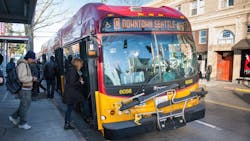Seattle mayor outlines proposed $31 million investment into safety, transit projects
Seattle Mayor Jenny Durkan outlined nearly $31 million in transportation safety projects and transit improvements the city will invest in over the next four years as part of its Vision Zero plan.
The funding is part of the mayor’s proposed 2020 budget and the project investments are designed to provide more non-single occupancy vehicle options to area residents.
“We must continue to build a more connected city,” said Mayor Durkan. “A world-class city like Seattle needs a world-class transportation and transit system. Taking transit, biking, walking, rolling and carpooling must be a real alternative to driving, especially if we want to achieve our climate goals. We will continue to invest in a city of the future that has safe, reliable transportation choices.”
Sale of city-owned properties on Mercer Street will provide $16.7 million to the Vision Zero plan “to end traffic deaths and serious injustices on city streets by 2030.” These investments include:
- $2.2 million for priorities in the Pedestrian Master Plan, including new sidewalks, curb bulbs and curb ramps at five intersections;
- $650,000 to construct a new pedestrian, bicycle and transit-only street on NE 43rd Street between the University of Washington and the Link Light Rail Station;
- $2 million in greenway projects in the Bike Master Plan, including traffic calming, new curb bulbs, curb ramps and wayfinding near Seattle Center;
- $3.5 million in the Highland Park Way Safety Project, including intersection modifications at Highland Park Way and SW Holden Street with traffic calming, new sidewalks and curb ramps and new transit stops; and
- $8.35 million in protected bike safety projects in the Bike Master Plan, with funds prioritized for projects listed in the 2019 Bike Master Plan Implementation Plan as funded through design and/or planning, including protected bike lanes, neighborhood greenways and trails.
The mayor’s budget also includes a one-time increase for the city’s purchase of Seattle Transportation Benefit District transit services operated by King County Metro in 2020. The increased appropriation will fund 25,000 additional transit service hours in March 2020 ($2.6 million), First Mile-Last Mile Service ($4 million) and transit capital enhancements to improve speed and reliability ($10 million).
The mayor’s 2020 budget invests $725.9 million in the Seattle Department of Transportation overall to advance transportation and transit priorities.
New investments in transit will include:
- An estimated 90 new blocks of dedicated bus lanes including Rainier Ave., a new northbound bus lane on Lake City Way at NE 98th St. and other locations across the city;
- Signal timing improvements on Rainier Ave; and
- $5 million devoted to new bus stop benches, landing pads and shelters across the city.
Over the past two years, the city has increased its investments in King County Metro bus service by 71 percent.
The mayor has also identified funding to close the $56 million gap for the Center City Connector streetcar.
About the Author

Mischa Wanek-Libman
Group Editorial Director
Mischa Wanek-Libman is director of communications with Transdev North America. She has more than 20 years of experience working in the transportation industry covering construction projects, engineering challenges, transit and rail operations and best practices.
Wanek-Libman has held top editorial positions at freight rail and public transportation business-to-business publications including as editor-in-chief and editorial director of Mass Transit from 2018-2024. She has been recognized for editorial excellence through her individual work, as well as for collaborative content.
She is an active member of the American Public Transportation Association's Marketing and Communications Committee and served 14 years as a Board Observer on the National Railroad Construction and Maintenance Association (NRC) Board of Directors.
She is a graduate of Drake University in Des Moines, Iowa, where she earned a Bachelor of Arts degree in Journalism and Mass Communication.
